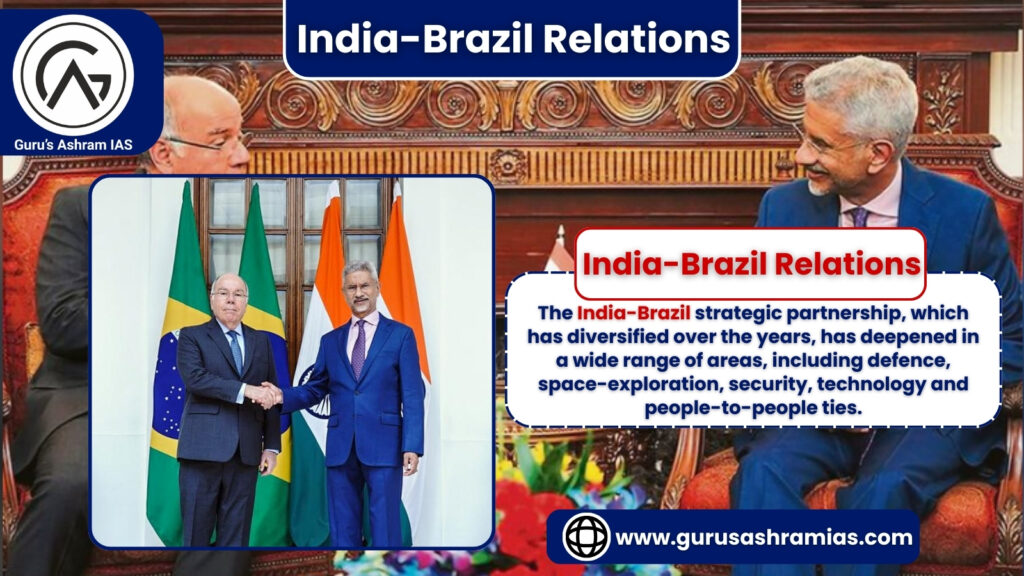India-Brazil relations
- The India-Brazil strategic partnership, which has diversified over the years, has deepened in a wide range of areas, including defence, space-exploration, security, technology and people-to-people ties.
- In another development, India and Brazil, two major players in global sugar production, have settled their World Trade Organization (WTO) trade dispute over sugar subsidies. This resolution is related to their growing cooperation in ethanol technology that has solved global sugar surplus issues, which affect prices.
India-Brazil sugar subsidy issue:
Background:
- In 2019, Brazil, along with Australia and Guatemala, filed a challenge to India’s sugar subsidy criteria at the WTO, arguing that India’s sugar subsidy policies violate several provisions of the World Trade Organization’s agriculture agreement.
- The US and Australia also highlighted a huge lacuna in India’s reporting, claiming that India has not included sugarcane or its derivatives in any domestic support notification since the marketing year 1995-96.
- India’s stance
- India defended its stance by saying that sugarcane procurement is managed by private mills and not by the government, thereby aligning with fair trade practices.
- India pointed out the error and said that the US-Australia analysis calculates the subsidy based on the total quantity of sugarcane produced in India in a given year, irrespective of whether the sugarcane was actually given to the sugar mills for crushing under the Cane (Control) Order or not.
Key areas of cooperation between India and Brazil:
Institutional engagement:
- India and Brazil enjoy close and multifaceted relations bilaterally and in various multilateral fora such as BRICS, IBSA, G4, G20, BASIC, International Solar Alliance (ISA), WTO, UNESCO and WIPO.
The bilateral engagements include:
- Strategic Dialogue led by National Security Advisors (NSAs) to address key regional and global issues of mutual interest.
- The India-Brazil Business Leaders Forum focuses on opportunities for trade, investment and economic cooperation.
- The Trade Monitoring Mechanism (TMM) tracks and resolves issues in bilateral trade.
- Economic and financial dialogue that includes cooperation on investment, trade and monetary policy.
- The Joint Defence Commission facilitates defence cooperation, including joint exercises, equipment procurement and intelligence sharing.
- The Joint Committee on Science and Technology promotes cooperation in research, development and exchange of knowledge.
Trade and Investment:
- India became the 5th largest trading partner of Brazil in 2021 with bilateral trade increasing from US $7.05 billion in 2020 to US $11.53 billion.
- This trade increased to US $15.2 billion in 2022 and in 2023, India’s exports to Brazil were US $6.9 billion and imports were US $4.7 billion.
Indias major exports to Brazil include:
- Agrochemicals, synthetic yarns, auto components and parts and imports from Brazil include crude oil, gold, vegetable oils, sugar and bulk minerals and ores.
- India and Brazil have seen investments in various sectors such as automobiles, IT, mining, energy, biofuels and footwear.
- India also signed a Preferential Trade Agreement (PTA) with MERCOSUR (Brazil, Argentina, Uruguay, Paraguay) in 2004.
Defence and Security Cooperation:
- India and Brazil signed a Defence Cooperation Agreement in 2003, in which the Joint Defence Committee (JDC) meetings institutionalised this cooperation.
- In 2006, he established a strategic dialogue led by India’s National Security Advisors (NSAs) to address regional and global issues.
- Additionally, an MoU on Cyber Security was signed between CERT-In and its Brazilian counterpart during the visit of the President of Brazil in January 2020.
Cooperation in Science and Technology:
- The Agreement on Space Cooperation between India and Brazil signed in 2004 enhanced cooperation in the field of data sharing and satellite tracking.
- The Brazilian Minister visited India in 2021 to witness the launch of Amazonia-1 satellite.
- Ayurveda and Yoga have also been recognized in Brazil’s health policy. An MoU on Traditional Medicine and Homeopathy was signed in January 2020.
Energy Security:
- In January 2020, an MoU was signed between Indian Oil Corporation and CNPEM of Brazil to set up a research institute on bioenergy in India.
- The two countries, along with the US, launched the Global Biofuel Alliance (GBA) during the G20 Summit in India in 2023 to increase the production and demand of biofuels.
Ethanol Blending Programme:
- Brazil, a leader in ethanol production since 1975, has provided technical assistance to India with the objective of facilitating technology transfer and boosting India’s biofuel production.
- Brazil has achieved a target of 27% ethanol blending in gasoline, making 84% of its vehicles equipped with flexible-fuel engines, capable of moving at different ratios of gasoline and ethanol.
- By July 2024, India has achieved 15.83% ethanol blending rate in petrol, which is targeted to reach 20% by supply year 2025-26.
What are the challenges in India-Brazil relations?
Trade Deficit and Competition:
- India has consistently maintained a trade deficit with Brazil due to Brazil’s dominance in agricultural products and India’s dependence on imports of commodities such as soybean and sugar.
- Both countries have implemented protectionist measures such as tariffs and subsidies to protect domestic industries, leading to trade friction and hindering the growth of bilateral trade.
Diverse interests of global forums:
- India and Brazil have different priorities when it comes to climate change and multilateral institutions.
- India focuses on reducing emission intensity, economic growth and energy access, while Brazil prioritises reducing deforestation in the Amazon to combat climate change.
- Similarly, their priorities are different in organizations like the United Nations and the World Trade Organization.
People to People Connect:
- People to people contacts between India and Brazil are relatively low, including trade, cultural and educational exchanges.
Role of China:
- There are also concerns that China’s status as Brazil’s largest trading partner could affect relations between India and Brazil.
Solution:
Financial support:
- India and Brazil should diversify trade by including value-added products, services and technology. They need to create a conducive investment climate and promote bilateral trade through agreements and joint ventures.
- In addition, investment in infrastructure projects such as transportation and logistics can boost trade and improve connectivity.
People to People Exchange:
- Enhancing cultural diplomacy and student exchanges can build trust between India and Brazil, while promoting tourism can promote both people to people connect and economic benefits.
The strategic cooperation:
- India and Brazil should enhance defence cooperation through joint exercises and technology sharing, as well as work together in global fora such as the United Nations and the G20 to advance their shared interests.
Technology and Innovation:
- India and Brazil should collaborate on research and development in renewable energy, biotechnology and IT to promote innovation and economic growth. In addition, investing in skill development and training can boost workforce competitiveness in both countries.





